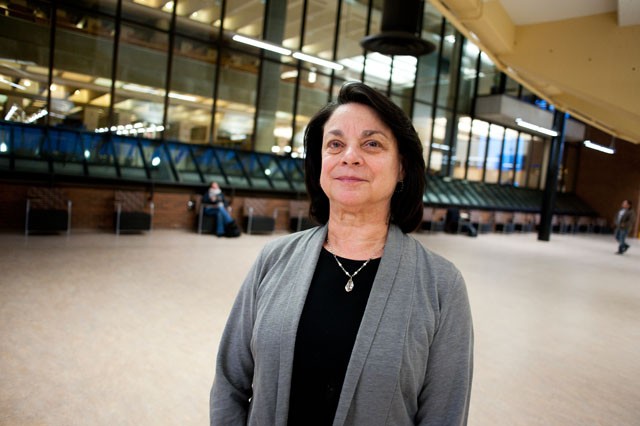Phyllis WalkerâÄôs message is familiar to University of Minnesota administrators, though itâÄôs not one theyâÄôre excited to receive.
âÄúIf the citizens of the state of Minnesota actually knew what was going on at the U, theyâÄôd be horrified,âÄù said Walker, the president of AFSCME Local 3800, which represents 1,600 clerical workers at the University.
Walker, who has held the post since 1996, was referring to the UniversityâÄôs rising tuition and the pay gap between mid- to upper-level administrators and âÄúfront-lineâÄù workers. Those workers include nearly 3,000 secretaries, technicians and support staff.
Walker contends the University has hired more and more middle management administrators despite a University-wide hiring freeze in 2008.
âÄúWeâÄôve lost over 150 front-line workers due to layoffs in the last two years,âÄù she said, âÄú[but] in the last two years middle management has increased since the hiring freeze began, and theyâÄôre actually making more now than they were two years ago.âÄù
Regarding rising tuition, Walker said, âÄúItâÄôs like the tuition is subsidizing middle management.âÄù
Walker, who took her first job at the University in 1981, has been a part of AFSME Local 3800 since it formed in 1991. Her passion for the union workers isnâÄôt just a matter of class politics. Along with two others who represent support staff at the University, the union âÄî or âÄúlocalâÄù âÄî has begun preparing to bargain for its next biennial contract.
Representatives from the University Office of Employee Relations , the department responsible for negotiating with the unions, would not comment on their relationships with Walker specifically, adding that it was too early to comment on the bargaining process to come.
The union is organizing a set of formal meetings to get input from members on concerns they have about the future contract.
In March or April the unions and human resource administrators will set dates to negotiate, Office of Human Resources Chief of Staff Joe Kelly said. Their current contract runs out June 30.
MembersâÄô concerns reflect frustrations with both the broader economy and the University.
âÄúOur members are just starting to realize what the ramifications of the three-day furlough [are],âÄù Walker said, adding that members are worried about being laid off and are concerned managers will overburden staff with work previously done by those laid off.
âÄúYou can only do eight hoursâÄô work in an eight hour day,âÄù she said.
In January, the Minnesota House passed a bill that would cut $89.2 million from the UniversityâÄôs projected two-year budget. Despite the bleak view for University finances and the corresponding outlook for its employees, Walker said she is optimistic, highlighting the unionâÄôs record of winning concessions at the negotiating table.
Those victories include raising the entry-level wage to $12 an hour in 2001, cutting the number of furlough days taken by workers this year from a proposed 10 to three and reducing a planned tuition hike for staff from 25 to 10 percent.
âÄúI could sit here all day long and tell you all the things we have accomplished,âÄù she said.
University senior Mia Overly is a member of Students for a Democratic Society and has worked with Walker on a coalition-led âÄúChop from the TopâÄù initiative, pushing the University to cut upper-level administratorsâÄô salaries. She said she appreciates that Walker doesnâÄôt regard the needs of students and staff as competing.
âÄúItâÄôs good to know that there are people that understand that students donâÄôt necessarily want to be pitted against staff,âÄù she said. âÄúPhyllis sees that too.âÄù
Organized laborâÄôs partnership with the University has varied. In 2007, University locals picketed for two weeks over stagnant wages.
âÄúWhen the University faces financial difficulties like those we are currently facing, it is always more challenging to achieve outcomes that satisfy everyone,âÄù Kelly said in statement.
âÄúHowever, we have faced, and worked through, tough budget years in the past and are optimistic that we will get through this one.âÄù
Walker also voiced optimism for working with the administration under incoming President Eric Kaler.
âÄúWe found it interesting, he did talk about noticing that there was a bloated central administration at the U,âÄù Walker said of remarks Kaler made several months ago.
Regardless of the UniversityâÄôs leadership, Walker promised a fight at the negotiating table and a continued focus on the gap between the UniversityâÄôs highest and lowest paid employees.
âÄúAt an institution where there are over 250 people who make over $200,000 a year,âÄù she said, âÄúthere should not be a group of people who have to work second and third jobs to put food on the table.âÄù

Image by Mark Vancleave
Phyllis Walker, president of American Federation of State, County and Municipal Employees Local 3800 poses for a portrait Tuesday in Willey Hall. AFSCME Local 3800 represents University clerical workers.
U unions ready to fight pay cuts
Clerical workers are ready to stand up against salary cutting that could possibly come with the University’s budget cuts.
Published February 9, 2011
0

